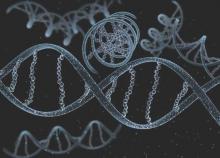Women with mutations in the BRCA1 gene are likely to have significantly reduced ovarian reserve, according to Dr. Kelly-Anne Phillips and her associates.
After adjusting for age, the average anti-Müllerian hormone concentration for the 172 BRCA1 mutation carriers tested was about 25% less than the 216 noncarriers tested. This difference remained after adjusting for oral contraceptive pill use at time of blood draw, BMI at cohort entry, cigarette smoking ever, length of time from blood draw to analysis, or exclusion of current oral contraceptive users and women who reported they were postmenopausal. The odds ratio for mutation carriers of having an AMH concentration in the lowest quartile was 1.84.
Average AMH concentration in women with BRCA2 mutations did not differ from women who do not carry the mutation. The odds ratio of having an AMH concentration in the lowest quartile for BRCA2 carriers was 0.87.
“Low AMH concentrations have not been shown to affect natural fecundability in young women but are associated with reduced fecundability in older women in their 30s,” the investigators wrote. “The reduced concentrations of AMH observed in this study were equivalent, for example, to a 2-year age increase for a woman in her mid 30s. Thus it is possible that the findings of our study might not translate to clinically relevant fertility implications for younger women, but may be important for the subgroup of BRCA1 mutation carriers who wish to conceive in their late 30s or 40s when fertility is reduced even in the general population.”
Find the full study in Human Reproduction (doi: 10.1093/humrep/dew044).


